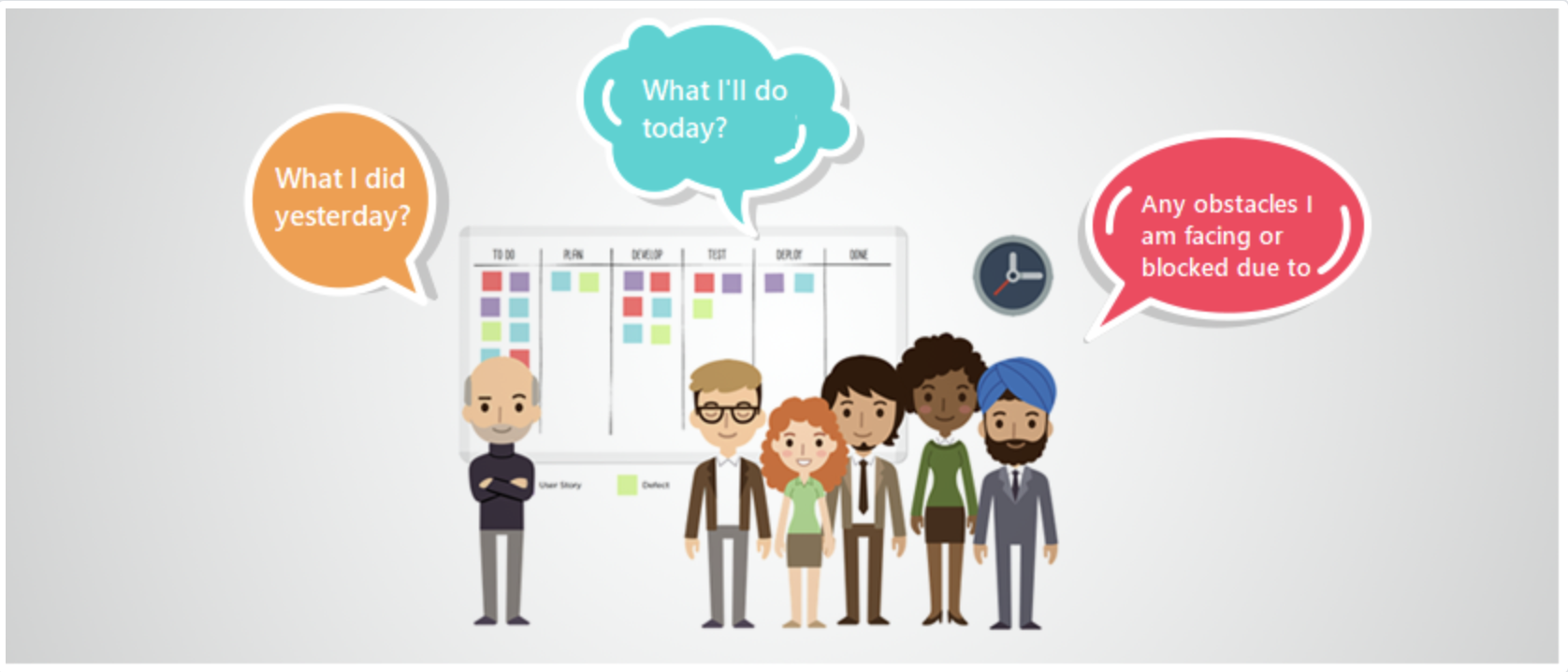Daily Stand-Up: A short, important & underrated event
Daily Stand-Up is the time when the team plans and revisits its plans for the ongoing sprint. This is commonly addressed using the following questions:
- What have you done since the last meeting to help the team meet their sprint goal?
- What will you do today?
- Any Impediments/blockers to your progress?

Sounds Simple? Just 3 easy questions to be answered, and it’s done.
But often simple things lead to bigger changes and more than often we take such simple events for granted which ultimately makes it inefficacious.
What an effective daily Stand-up results in?
- Brings every team member on the same page about the team’s progress with respect to the team’s sprint goals.
- Understanding the team’s progress can be a good reason to get motivated and get tasks done. Healthy competition can always be a good source of motivation.
- Helping team members to resolve their impediments. Together, the team finds ways to support and help each other.
- It sets the tone for the entire day, as we are not just “physically” present at work. We become “mentally” aware as well.
What mistakes do we often tend to make?
- Casual Attitude: We often do not give the importance it needs, taking this meeting for granted. Answering those 3 questions very casually.
- Skipping Daily Stand-Up if there are no updates. Often, we hear, “Let’s cancel today’s daily” because:
- We are busy with high-priority issues.
- We have refinement today; let’s use that meeting to give our updates.
- No visible progress on the tasks.
Team members find reasons to avoid daily rather than connecting to know the progress done and problems faced by the team members.
- Showing up Late: This meeting should be short, time-boxed (15 minutes), and succinct. Having no punctuality for daily stand-ups or showing up late to such meetings could more often be considered undervaluing what it could bring to the table.
- Repetitive Status: If this is the case, that means there is a blocker that a team member is hesitant to discuss, which ultimately would keep him stuck in a rut. Instead, if a team member brazenly describes the impediment, it could save him/her sometimes because, after all, every experience counts, and every member adds some value to the organization, which could help him make notable progress with their tasks.
- Just Hearing: More often, team members choose to stay silent. This should be alarming because silence could be COSTLY. Stand-ups shouldn’t be about getting done but about getting started. If team members could have this common attitude towards daily stand-ups, -a team could do wonders. There should perhaps be an atmosphere that values each voice.
What can be done to deal with the above-mentioned problems?
- Try not to keep the meeting monotonous. The three questions can be boring to answer every day, but it’s never about the questions; it’s about the answers. Not being monotonous doesn’t imply that we should change the timings for Daily. Preferably everyday morning.
- Correct the ones joining late with something like dares, beneficial to the team.
- Focus on listening and being active till the meeting ends. The order of team members giving updates should be random (No round-robin), which keeps the members alert.
- Team Members should take 5 minutes out beforehand and prepare for the daily stand-up. Have a look at the board beforehand. RESPECT everyone’s time and not take away FOCUS of team members from their work. One-to-one, side, and long conversations should be taken outside of DSMs.This helps to keep the updates more meaningful and speaks a lot about your involvement in the event.
- Avoid Skipping/canceling the daily Stand-up. Just 15 minutes can be spared and will not hamper the work. These 15 minutes will help and be a good start for the entire day.
Daily Standups can deliver critical insights into where the project stands, where they’re headed, and any potential issues that need to be addressed. All four events followed in scrum have their purpose and are always beneficial to the team.
Hence daily stand-ups should encourage members to speak up, making them feel empowered. After all, empowered team members create empowered teams, and empowered teams create empowered organizations!
Please let me know your feedback on my e-mail: omkar.pilvankar@tothenew.com .
Thank You.

